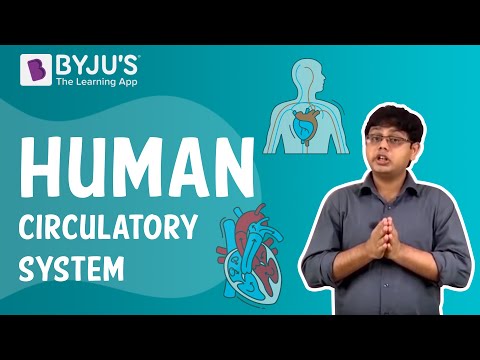According to the CBSE Syllabus 2023-24, this chapter has been renumbered as Chapter 15.
All life on earth needs sustenance to survive, furthermore, life has evolved various mechanisms that facilitate this transport of materials. Organisms like the sponge use the water currents to circulate water and nutrients throughout their body cavities, enabling the cells to exchange materials. More complex organisms, such as humans, have specialized systems that transport nutrients to the body and waste materials away from it.
Blood and lymph are the two most important body fluids in the human body. Blood comprises red blood cells, white blood cells, platelets and plasma.
Here in these notes, students can find complete information about the blood, its components, composition, functions and types of circulatory systems.
Blood
Blood, also known as connective tissue, is responsible for transporting oxygen, nutrients, hormones, and respiratory gases to the body and waste materials away from it. The total volume of blood in the human body is approximately seven per cent of the total body’s weight which will be about 5 to 5.5 litres (1.5 gallons) of blood. Human blood comprises 4 components that serve specific tasks, namely:
- Plasma
- Red Blood Cells
- White Blood Cells
- Eosinophil
- Basophil
- Neutrophil
- Lymphocytes
- T-Lymphocyte
- B-Lymphocytes
- Monocytes
- Platelets
Lymph
Lymph is a colourless fluid present in the interstitial tissues. It circulates throughout the lymphatic system. It can be defined as blood without the RBCs. The exchange of nutrients, hormones, and gases occurs through this fluid. It consists of lymphocytes that play a major function in the immune responses of the body.
Human Circulatory System
The human circulatory system consists of four main organs, which function together, and each of them has specific roles and functions that help in the smooth circulation of blood to different parts of the body. The vital circulatory system organs include:
- Heart
- Blood
- Blood Vessels
- Lymphatic system
For more information on Human Circulatory System, watch the below video

The Heart
Anatomically, humans have a closed circulatory system, meaning that the blood flows through closed loops, which are systematically pumped by the heart. The human heart is a four-chambered organ that is made up of a special kind of muscle called the cardiac muscle. This is unique as the cardiac muscle is highly resistant to tiredness and fatigue due to the large number of mitochondria present within it.
Important Question for Class 11, Chapter 18 – Body Fluids and Circulation
- What are the three types of circulation?
- What are the different components of blood?
- Is the human circulatory system open or closed?
- Write a few differences between hypertension and hypotension.
- Explain the structure of the human heart with a neat labelled diagram.
| Also Access |
| NCERT Solutions for Class 11 Biology Chapter 18 |
| NCERT Exemplar for Class 11 Biology Chapter 18 |
Stay tuned with BYJU’S to explore more information and important questions for Chapter 18 – Body Fluids and Circulation, heart, blood and other related topics.
| Heart Diseases | Double Circulation |
Frequently Asked Questions on CBSE Class 11 Biology Notes Chapter 18 Body Fluids and Circulation
What is meant by systemic circulation?
Systemic circulation provides the functional blood supply to all tissues. It carries oxygen and nutrients to the cells and picks up carbon dioxide and waste products. Systemic circulation carries oxygenated blood from the left ventricle, through the arteries, to the capillaries in the tissues of the body.
What are lymph nodes?
Lymph nodes filter substances that travel through the lymphatic fluid, and they contain lymphocytes (white blood cells) that help the body fight infection and disease. There are hundreds of lymph nodes found throughout the body.
What is the function of the heart?
The main function of the heart is to circulate or move blood throughout our body. It is also responsible for maintaining the blood pressure.
Comments